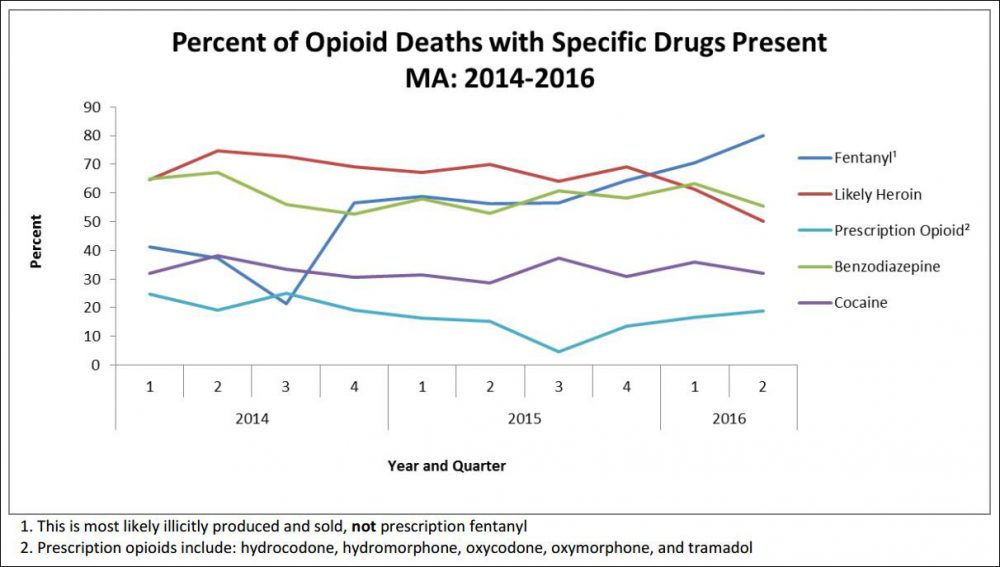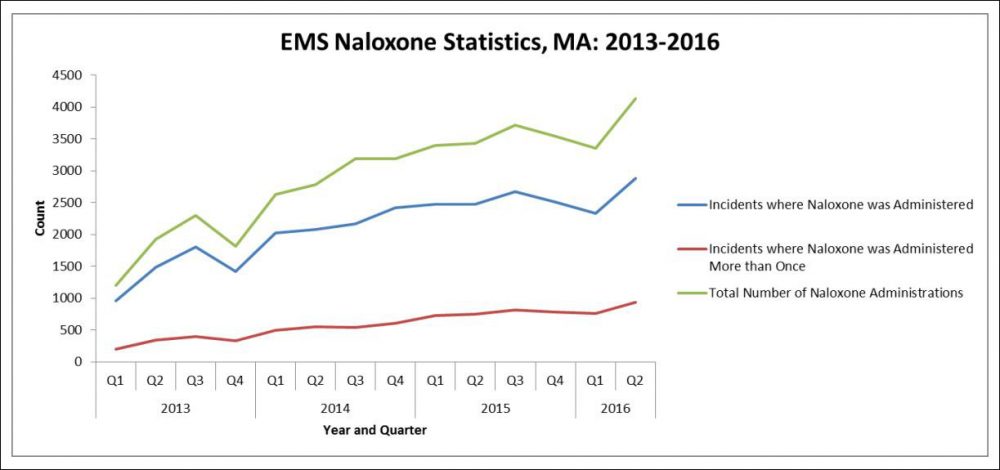Advertisement
Roughly 5 Mass. Residents Are Dying Daily Due To Overdose, Most Involving Fentanyl
Fentanyl, an opioid 50 times more potent than heroin, is present in an increasing number of overdose deaths across Massachusetts.
It appears be the reason why more men and women are dying even though heroin use and prescriptions for opioid pain medications are down. The state estimates between 1,397 and 1,475 overdose deaths so far this year. That's more than five people a day.

The somber update is in the Baker administration's latest quarterly report, a nearly real-time view of the opioid epidemic in the state. As Department of Public Health Commissioner Monica Bharel acknowledges, the numbers beg the question: Is the state on the right track in its attempt to curb this crisis?
"The trends are troubling," Bharel said. "But at no time in the commonwealth’s history have we been more focused on this public health crisis. We’re working really hard across the state to address this epidemic in a comprehensive way."
Fentanyl is rocking physicians and families coping with addiction. Seventy-four percent of men and women who died in July, August and September had it in their system.
"Almost everyone who comes into addiction treatment through our clinic now has fentanyl on their initial drug screen and many patients don’t even know that it’s mixed into what they’re using."
Dr. David Roll, medical director at CHA Health Centers
"Almost everyone who comes into addiction treatment through our clinic now has fentanyl on their initial drug screen and many patients don’t even know that it’s mixed into what they’re using," said Dr. David Roll, the medical director at the CHA Health Centers in Everett and Revere.
The Drug Enforcement Administration says a few grains of fentanyl can kill most Americans. The fear that inspires may be good for some patients.
"So many patients are surprised and terrified when they learn that that’s what they’re using, that they’re more interested and willing to get into treatment, including medication assisted treatment," Roll said.
In Revere, where Roll sees patients, overdose calls to 911 have already passed last year’s high. Statewide they are up 18 percent in the first six months of this year as compared to last.

And first responders report that on average, they need to give more than one dose of the overdose reversal drug naloxone to each patient. Revere Fire Chief Christopher Bright says he's glad to be fielding more calls.
"The stigma issues are being addressed and more people are being forthcoming in trying to address the issue," Bright said. "It’s not to say that the crisis is going away any day now, but at least we’re moving in the right direction."
It doesn’t feel that way to Patti Scalesse, who started Everett Overcoming Addiction a few years ago when she discovered her son was addicted to heroin.
"I woke up this morning crying. I'm scared. I'm the mom of an addict and I'm scared," Scalesse said. "It's not getting any better. Kids are dying at an alarming rate. I thought it was bad before. The last couple of months have been horrible."
The crisis is hitting young men like Scalesse's son especially hard. He's in treatment again after several relapses.
Advertisement
Seventy-five percent of overdose deaths so far this year were men. Thirty-one percent of all overdoses, fatal and not, were men between the ages of 25 and 34.
About half of those who died of an overdose in the second quarter of this year had also taken a benzodiazepine, such as Valium, Xanax and Klonopin. Thirty percent showed signs of cocaine, a combination sometimes called a speedball.
Some doctors and families say they still have trouble finding a bed for those who need treatment. The state says there are more coming online in Taunton and western Massachusetts.
This segment aired on November 7, 2016.
